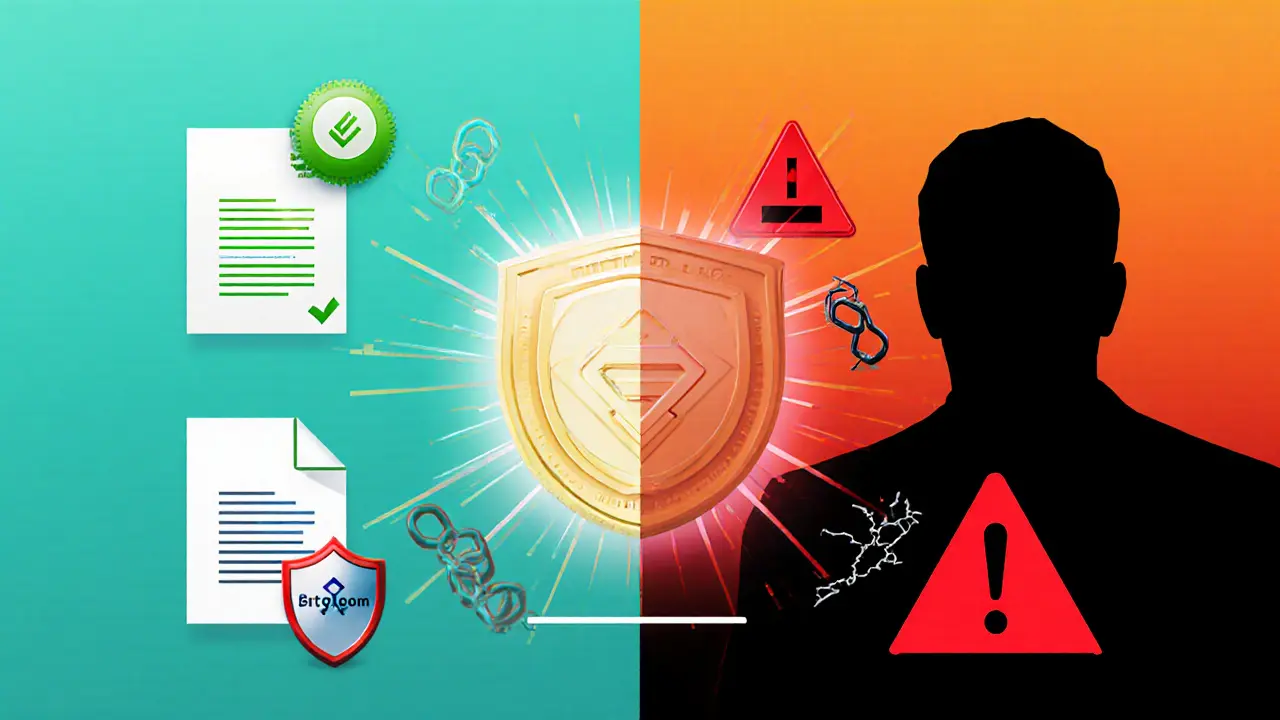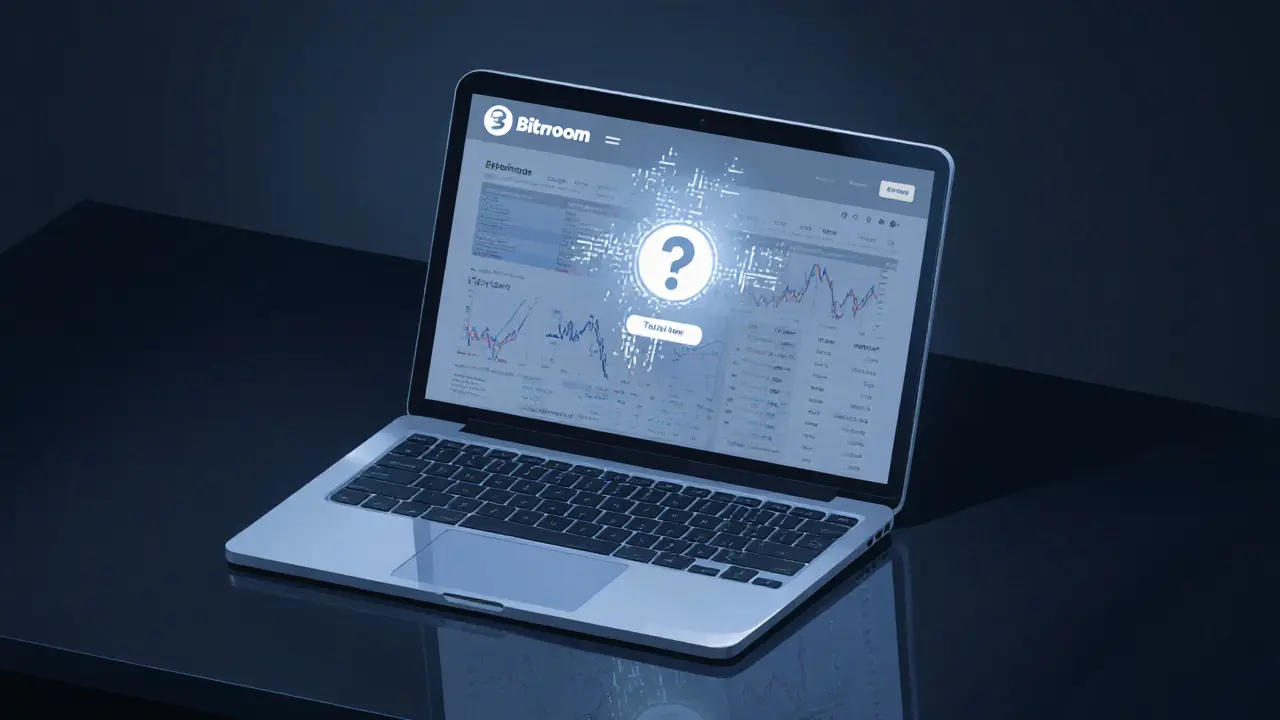Crypto Exchange Legitimacy Checker
Exchange Comparison Guide
Established exchanges like Bitstamp, Binance.US, and Kraken demonstrate legitimacy through:
- Public regulatory licenses
- Third-party security audits
- Transparent fee structures
- Strong customer support
- Community trust and transparency reports
Red flags for suspicious exchanges:
- No verifiable legal entity
- Absence of KYC/AML protocols
- Unrealistic fee claims
- Redirected customer support
- Bad community sentiment
When you hear a new name in the crypto world, the first question is always the same: Bitroom review. Is this platform a trustworthy place to trade, or just another headline in the endless list of crypto scams? Below we break down everything you can find about Bitroom, compare it to well‑known exchanges, and give you the tools to decide whether to keep your money safe.
What is Bitroom?
Bitroom is a purported cryptocurrency exchange that claims to offer spot trading, low fees, and a sleek mobile app. The website presents professional‑looking graphics and a support chat that appears 24/7. Aside from these marketing claims, no registration, licensing, or audit documents are publicly available.
Why the Lack of Information Matters
Legitimate exchanges are listed on regulatory registers, have published security audits, and appear in reputable industry reports. A quick search of global exchange databases, the Financial Crimes Enforcement Network (FinCEN) list, and the European Securities and Markets Authority (ESMA) yields zero mention of Bitroom. This silence is a red flag because reputable platforms never hide their compliance status.
Regulatory Red Flags - The DFPI Tracker
The California Department of Financial Protection and Innovation (DFPI) maintains a Crypto Scam Tracker that records fraudulent platforms targeting residents. While Bitroom is not explicitly named, the tracker repeatedly warns about “exchange‑like” sites that mimic the branding of real exchanges. These scams often use pig‑butchering tactics - luring victims with high‑return promises, then siphoning funds once a trade is initiated. The DFPI’s past cases involve losses exceeding $179,000 for a single victim, underscoring the financial danger of unverified platforms.
How Legitimate Exchanges Prove Their Trustworthiness
To understand what proper due diligence looks like, let’s look at three industry stalwarts:
- Bitstamp - founded 2011, registered in Luxembourg, audited annually, and holds a Malta Financial Services Authority (MFSA) license.
- Binance.US - launched 2019, complies with U.S. state‑by‑state regulations, and publishes quarterly transparency reports.
- Kraken - operating since 2011, federally registered as a Money Services Business (MSB) in the United States, and runs a bug‑bounty program that has paid out over $2million.
Each of these platforms openly shares its security architecture: cold‑storage percentages, multi‑factor authentication (MFA), and insurance funds that cover certain breaches. Bitroom offers none of these details.

Comparison Table: Bitroom vs. Established Exchanges
| Exchange | Year Launched | Regulatory Status | Known Security Features | Public Trust Indicators |
|---|---|---|---|---|
| Bitroom | Unknown | None listed on any regulator | Unclear - no cold‑wallet or MFA info | Absent from major ranking sites (CoinMarketCap, CryptoCompare) |
| Bitstamp | 2011 | Licensed in Luxembourg; MFSA approved | 99.9% funds cold‑stored, 2FA, regular audits | Over 1.5M users, audited financials |
| Binance.US | 2019 | State‑by‑state compliance, AML/KYC enforced | SAFU insurance fund, device binding, SAFU token | Millions of daily trades, transparency reports |
| Kraken | 2011 | US MSB registration, GDPR compliant | Cold‑storage >95%, hardware‑wallet integration, bug bounty | Consistently top‑ranked on Trustpilot, industry awards |
Red Flags Specific to Bitroom
- No verifiable corporate entity. The website lists a generic address that redirects to a parking page when checked on Google Maps.
- Absent KYC/AML processes. Users report being able to open an account with just an email, which contradicts global AML standards.
- Unrealistic fee promises. Advertising “0.01% trading fees” while not disclosing withdrawal fees or hidden spreads.
- Customer support redirection. Chat logs often end in a request to “deposit more to unlock withdrawals,” a classic pump‑and‑dump lure.
- Negative community sentiment. Reddit threads and crypto‑forum posts label Bitroom as a “potential rug pull” with multiple users reporting vanished accounts after small deposits.
How to Protect Yourself from Unverified Exchanges
- Verify regulatory registration. Search the exchange name on the website of the relevant financial authority (e.g., DFPI, FCA, ASIC).
- Check for third‑party audits. Reputable platforms publish audit reports from firms like CertiK or Quantstamp.
- Look for transparent fee structures. Hidden fees are usually buried in fine print or only disclosed after a deposit.
- Use hardware wallets. Keep the bulk of your crypto offline; avoid keeping large balances on any exchange you haven’t vetted.
- Search community feedback. Platforms like Reddit’s r/cryptocurrency and Trustpilot aggregate real‑user experiences.
Bottom Line - Should You Trade on Bitroom?
Based on the lack of verifiable data, absence from any regulator’s list, and multiple community warnings, the safest answer is: steer clear. If you already have funds on Bitroom, consider withdrawing immediately and moving them to a hardware wallet or a well‑known exchange that offers insurance and strong security controls.
Quick Takeaways
- Bitroom cannot be located in any official crypto‑exchange registry.
- Regulators such as the DFPI flag platforms with similar branding as high‑risk.
- Established exchanges provide clear licensing, audits, and security features - Bitroom does not.
- Follow the five‑step protection checklist before depositing any crypto.

Frequently Asked Questions
Is Bitroom a legally registered exchange?
No. Searches of major regulatory databases (DFPI, FCA, ASIC, MFSA) return no record of Bitroom being licensed or registered. Legitimate exchanges always list their regulatory status publicly.
Can I trust the security claims on Bitroom’s website?
Without third‑party audit reports, cold‑storage percentages, or MFA details, those claims remain unverified. In the crypto space, transparency is a core security signal.
What should I do if I’ve already deposited funds on Bitroom?
Attempt an immediate withdrawal. If the platform blocks the request, document all communications and consider filing a complaint with your local consumer protection agency or the DFPI if you’re in California.
Which exchanges are safest for beginners?
Platforms like Bitstamp, Kraken, and Binance.US offer clear regulatory compliance, robust security features, and extensive educational resources. They are widely recognized and have proven track records.
How can I spot a crypto‑exchange scam?
Watch for missing licensing info, vague security details, overly aggressive marketing promises, and lack of independent reviews. Cross‑check the name on regulator watchlists like the DFPI Crypto Scam Tracker.


Author
Ronan Caverly
I'm a blockchain analyst and market strategist bridging crypto and equities. I research protocols, decode tokenomics, and track exchange flows to spot risk and opportunity. I invest privately and advise fintech teams on go-to-market and compliance-aware growth. I also publish weekly insights to help retail and funds navigate digital asset cycles.